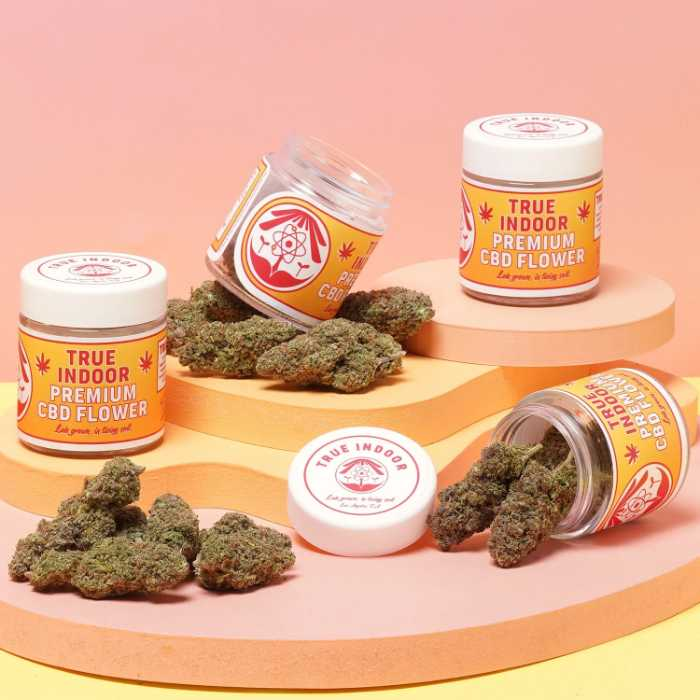Not sure if CBD is right for you?
Check out these benefits!

CBD is all the rage these days. It seems like everywhere you turn, another person is raving about how CBD has helped them with this or that.
You may have seen CBD popping up everywhere, from your local pharmacy to your favorite coffee shop. But what is CBD and what are its benefits? Is it safe to take every day? What disorders can it treat? Is it the same as cannabidiol? Keep reading to find out everything you need to know about CBD treatment and CBD benefits.
Cannabis was once demonized but is now becoming more mainstream as the benefits of both recreational and medicinal use are being explored by scientists and regular people alike.

CBD specifically has been shown to be helpful in treating anxiety, depression, chronic pain, inflammation, seizures, chronic stress, insomnia, and so much more.
What is CBD?
CBD, or cannabidiol, is a compound found in cannabis plants. Unlike its more famous cousin THC, CBD does not produce a psychoactive effect. This means that you can't get "high" from using CBD products. However, CBD has been shown to have a variety of potential health benefits, including reducing anxiety and inflammation, helping to improve sleep, and alleviating pain.

CBD is just one of many compounds, known as cannabinoids, found in the cannabis or marijuana plant (Cannabis sativa). Tetrahydrocannabinol (THC) is the main psychoactive cannabinoid in cannabis. It's what gives marijuana its "high." CBD is non-psychoactive. This means it won't alter your state of mind when you use it.
CBD is non-addictive, has shown to be effective in treating a wide variety of health conditions, both physical and mental, and is available in multiple forms for easy consumption. You can find CBD in tinctures, oils, edibles, topical creams, vapes, and even as an ingredient in your daily coffee.
CBD and Pain Relief
One of the most well-known benefits of CBD is its ability to relieve pain, including cancer pain, and reduce inflammation. CBD works by interacting with the body's endocannabinoid system, which helps to regulate things like sleep, appetite, and pain.

Research has shown that CBD can be effective in treating both chronic and acute pain, making it a popular choice for those suffering from conditions like rheumatoid arthritis or fibromyalgia.
In addition, it can help improve heart health by reducing blood pressure and cholesterol levels. It may also help improve sleep quality and quantity.
CBD and Anxiety Relief
Anxiety disorders are one of the most common mental health conditions in the United States, affecting millions of people every year. While there are a variety of medications available to treat anxiety, many people prefer to use natural alternatives like CBD.

CBD is thought to work by reducing levels of stress and anxiety. Researchers noted that it was as effective as the anti-anxiety medication Buspirone in reducing anxiety symptoms.
CBD and Sleep Aid
If you've ever struggled to get a good night's sleep, you're certainly not alone. Insomnia and sleep disorders are a common problem, affecting up to 30% of adults at some point in their lives. CBD may be able to help with this problem as well.
Scientific evidence has shown that CBD can promote wakefulness during the day and improve sleep quality at night. This makes it an ideal choice for those who want to avoid the grogginess and potential risks that come with many traditional sleep aids.
May Promote Heart Health
Heart disease is the leading cause of death in the United States. Many different factors contribute to heart disease, including high blood pressure, high cholesterol, and obesity. CBD oil may be able to help reduce some of these risk factors by promoting healthy blood pressure levels and cholesterol levels.
A 2017 study published in JCI Insight found that CBD oil was able to help reduce blood pressure in rats. Another study published in 2012 found that CBD oil was effective in reducing triglyceride levels and increasing HDL (good) cholesterol levels in rats.
Could Have Neuroprotective Properties
Neurodegenerative diseases like Alzheimer's and Parkinson's are two of the most common age-related diseases in the world. There is no cure for either disease, and currently available treatments only aim to alleviate symptoms rather than slow or stop the progression of the disease itself.
Research studies suggest CBD oil has shown promise as a potential treatment for both Alzheimer's and Parkinson's disease. A 2014 study published in Frontiers in Pharmacology found that CBD had neuroprotective effects on rats induced with Parkinson's disease. Other studies suggest that CBD may help to reduce inflammatory and neuropathic pain, which can be difficult to treat.
Another study published in 2016 found that the administration of CBD could help reduce cognitive decline in rats with Alzheimer's disease. While more research is needed to confirm these results, they offer hope for those suffering from these degenerative diseases.
May Help Combat Cancer
Cancer is one of the leading causes of death worldwide. Conventional cancer treatments like chemotherapy often come with harsh side effects like nausea, vomiting, hair loss, and fatigue. Some cancer patients have found relief from these side effects by using CBD oil. A 2017 study published in JAMA Oncology found that CBD was effective in reducing the pain of cancer treatment in rats.
A 2018 review looked at studies on animals and humans to determine if CBD had any anti-cancer properties. The review’s authors concluded that “there is convincing data suggesting that cannabinoids possess anticancer activity .” However, more research is needed before any definitive conclusions can be made.
What disorders can CBD treat?
CBD has shown efficacy in treating a wide variety of both physical and mental disorders including but not limited to: anxiety, depression, chronic pain, inflammation, seizures, chronic stress, insomnia, ADHD/ADD symptoms, PTSD (post-traumatic stress disorder), OCD (obsessive-compulsive disorder), bipolar disorder symptoms and so much more.
CBD is a popular choice for those looking for natural relief from a variety of conditions. If you're considering trying CBD, be sure to talk to your doctor first to make sure it's right for you.
Is CBD Safe?
CBD is generally considered safe for most people, but it can cause some mild side effects such as fatigue, diarrhea, and changes in appetite. It's also important to note that CBD can interact with certain medications, so if you're taking any prescription drugs, it's always best to check with your doctor before starting a CBD regimen.

Is CBD Legal?
Yes, cannabidiol (CBD) oil is legal in the U.S. as long as it contains less than 0.3% THC. THC is the main psychoactive cannabinoid found in cannabis. It's what gives marijuana its "high." Federal law requires all CBD products to contain less than 0.3% THC.
Some states have finalized laws that allow for broader use of medical marijuana and products containing THC. In those states, however, it's still important to know local laws about possession and use.
However, even if you're not in one of those states where recreational marijuana use is legal, you can still find high-quality CBD products made from industrial hemp with pain-relieving effects. Check your state laws for specific guidelines!
CBD Risks
It's important to note that CBD interacts with other medications you may be taking, so be sure to speak with your healthcare professional before starting any new supplement regimen.
Additionally, it's important to buy your CBD products from a reputable source. Unfortunately, the FDA does not currently regulate the sale of nonprescription CBD products (pending further research), which means that some companies may not be truthful about what their products actually contain.
Look for companies that have their products tested by an independent third party and make sure those results are readily available on their website.
All True Indoor CBD products are third-party tested with reports available on product pages. Steer clear of companies that make extravagant claims about their products' efficacy; if it sounds too good to be true, it probably is.

Is CBD Good to Take Everyday?
The short answer is yes! Because CBD is non-addictive and has no psychoactive properties, it is safe to take every day. In fact, many people do take it every day as part of their wellness routine.
Some prefer to take it only when they are experiencing symptoms while others find that maintaining a constant level in their system provides the most relief. Experiment to see what works best for you.
It’s important to note that while CBD is considered generally safe, taking too much of it may result in drowsiness or an upset stomach. Start with a low dose and increase gradually as needed until you find your sweet spot.
Is Oil CBD the Same as Cannabidiol?
Yes! "Oil CBD" is simply another way of saying "cannabidiol." You'll often see products labeled as "CBD oil," "full-spectrum hemp oil," or just "hemp oil." These all refer to products that contain cannabidiol. Hemp-derived CBD products have the same active ingredient as CBD derived from the cannabis sativa plant.
How Long Does It Take for CDB Oil to Kick In?
This depends on a variety of factors, including how you take the oil (i.e., sublingually [under the tongue], orally [by mouth], or topically [on the skin]), your body weight and composition, and the quality of the product you're using.
That said, most people report feeling the effects within 15-30 minutes of taking CBD oil sublingually. Topical application may take longer to feel the effects because it needs to be absorbed through the skin into the bloodstream.
Oral ingestion may take even longer because it must first be broken down by the liver before entering the bloodstream. Ultimately, it just depends on how you take it and your physiology.
However long it takes for the effects to kick in though, they tend to last 4-6 hours when taken orally and up to 8 hours when inhaled.
Conclusion
Hundreds of millions of people around the world enjoy using cannabidiol (CBD), yet many remain unaware of its therapeutic properties due to decades of stigma surrounding cannabis plants. Now that attitudes are changing—and laws are following suit—it's easier than ever to learn about and try CBD for yourself if you're curious about its potential benefits.
CBD is a popular choice for many adults seeking natural alternatives for health issues like pain, anxiety, and insomnia. If you're considering trying CBD yourself, be sure to talk to your doctor first to make sure it's right for you. Once you've gotten the green light from a healthcare professional, head on over to our website to check out our selection of high-quality pure CBD!
There you have it! Everything you need to know about cannabidiol—from what it is and what it does to how long it takes for it to kick in. We hope this article has helped clear up any confusion you may have had about CBD. Scientific references have been linked when mentioned. If you have any additional questions that we didn't cover here, feel free to reach out and we'll do our best to answer them for you!
